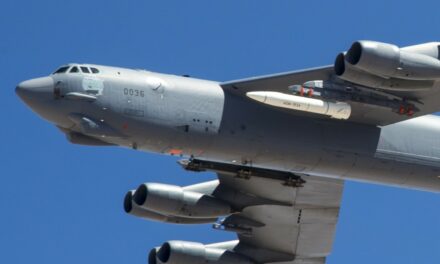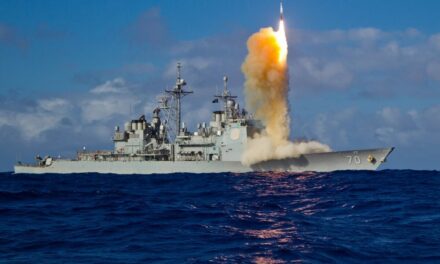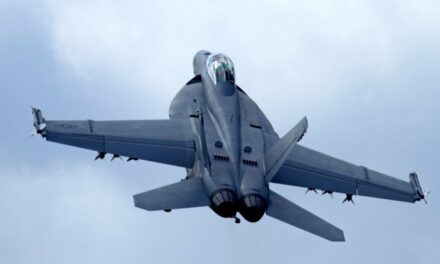We support our Publishers and Content Creators. You can view this story on their website by CLICKING HERE.
In the ongoing Israel-Hamas war, Russia is – predictably – backing Hamas. Prior to the gruesome Hamas attack on October 7, Russian President Vladimir Putin tried to cultivate an image of a peacemaker who could talk to all major – often opposing – players in the Middle East, such as Israel and Iran, along with their proxies such as Hezbollah and Hamas. Moscow’s response to the Hamas attack, however, represents a cardinal break from this longstanding public relations strategy.
The Kremlin refrained from directly condemning Hamas, while Putin waited ten days to call Benjamin Netanyahu. He subsequently compared Israel’s blockade of Gaza to Nazi Germany’s siege of Leningrad. As Iranian proxies escalate actions across the Middle East against Israel and U.S. forces, Israel’s once-warm relationship with Russia will change.
Middle Ground in the Middle East – With Bias
First, to state the obvious, the ongoing escalation involves both Russia and Iran—and it matters to both the U.S. and Israel, both of whom are being attacked by Iranian proxies. Putin stands to benefit from regional escalation because it is a distraction for the West, its allies, and partners from Ukraine. But more importantly, he is also likely fueling this escalation rather than simply reaping the benefits of a spoiler.
This time he is potentially shaping the region and the relationships with major consequences for all. Russia’s longstanding and deepening relations with Iran aside, reports over the summer indicated increased efforts between Tehran, Damascus, and Moscow to drive the U.S. out of Syria. The Russian military increased harassment of U.S. forces with the U.S. in Syria over the summer, including causing damage to U.S. drones. These efforts are now dwarfed by the daily attacks on U.S. military bases, which have followed Hamas’s October 7th attack. Most recent reports of a potential transfer of the antiaircraft system Pantsir S-1 from the Wagner group in Syria to Hezbollah in Lebanon are further examples of Russia’s efforts to enable continued escalation.
To be sure, such a transfer would not fundamentally complicate Israeli military operations along its northern border, but it doesn’t need to. Escalation can be simply about sending a message or adding fuel to the fire by compounding on existing issues, even if small and militarily negligible to the overall status of opposing forces. Israel has enough to deal with as the war in Gaza rages, the Iranian-backed Houthi militia reportedly fired drones and missiles toward Israel. Hezbollah continuously fires rockets from Lebanon towards the Golan Heights. Moscow, for its part, is signaling that it is escalating not only with the U.S. but also with U.S. ally Israel. While the Kremlin’s rhetoric and courting of Hamas impart that it sees such escalation as being in its best interest. Otherwise, Putin would simply not have pursued this approach. He would have rushed to offer condolences to Israel and condemn Hamas. In that context, his subsequent offer to mediate would have appeared more credible to Israel.
Secondly, and related to why Putin sees escalation as in his interest, there is the broader strategic picture to consider. That Putin has chosen a side in the Israel-Hamas war suggests he calculated that the cost of worsening Russia-Israel relations is less than the benefits of aligning closer with anti-American forces in the Middle East. Thus he is committing to helping fuel the anti-American and anti-Israel sentiment in the Arab world and beyond. He likely appreciates the stumbling block the current situation creates for Israel’s normalization with Arab states.
Indeed, Moscow had been bitter that American, rather than Russian, mediation helped broker a significant Middle East peace initiative. Putin will only benefit as these efforts take a step back because, in his zero-sum view, a setback for the U.S. is a win for Russia in and of itself, but also because, in this case, it puts Israel in a weaker position while the Arab world is likely to be more receptive to Putin’s message. This reality likely contributes to the reasons why Putin believes he can afford to see worsened relations with Israel.
Middle East in Chaos Helps the Cause
Meanwhile, increased chaos encourages authoritarianism that erodes the liberal world order, including through escalation with American allies, which serves to help Putin fight the war in Ukraine. For Putin, the issue is likely less about Hamas than it is about Iran, whose transfer of kamikaze drones has helped the Russian military terrorize Ukrainians. Moscow is currently building a plant that will mass produce these drones, according to the latest satellite imagery. And it should come as no surprise that it is difficult to trace how Russian weaponry finds its way to Iranian proxies, including Hamas, because they tend to be distributed by Iran.
Looking Beyond Western Analysis
Western analysts, constrained in their regional views of Great Power Competition, tend to look at the European in Middle East theaters as separate. Still, they are – and historically have been – one and the same for the Kremlin. Putin remains committed to playing the long game with the West and waits for the U.S. and its allies to lose the will to compete, which underpins Western unity and resolve in helping Ukraine.
If it is surprising for some that Putin chose a side now in the Israel-Hamas war, it should not have been. No matter his efforts to build good relations with all Middle East actors Putin always leaned closer to anti-American forces in the region. More to the point, in Syria, Putin chose a side in September 2015 when he intervened on behalf of Bashar al-Assad and saved the leader from an eminent fall. That intervention brought Russia to Israel’s doorstep in the first place, and in taking control of the Syrian skies it was able to hold leverage over Israel—Israel became dependent on Russia’s goodwill to carry out its strikes against Iran-backed forces in Syria.
Since Russia’s invasion of Ukraine, Israel has engaged in a difficult balancing act; trying to maintain Israel’s relationship with Moscow while recognizing the ramifications of its invasion of Ukraine. But just as Russia’s invasion of Ukraine was a world-changing event, the Middle East changed on October 7, and Putin is now taking full advantage of this moment.
Israel Should Take New Stance
Now that Putin has cast Russia’s lot with Hamas, Israel should reevaluate and recalibrate its relationship with Moscow, which could include doing more on Ukraine. Israel could start by inviting Ukrainian President Zelensky and other senior Ukrainian leadership to come to Gaza to observe military operations and have discussions about challenges and lessons learned from their shared experiences in war. Given that Hamas has given RT, Russia’s main propaganda channel abroad, access to the Gaza tunnel network, Israel could also invite Ukrainian media to write about this experience and cover Israel’s war overall. Inviting Ukrainian journalists would help push back on Russia’s narratives in the Middle East. To date, Moscow has been successful in projecting its narrative in the region. It is critical that these narratives are challenged.
As U.S. President Biden said on October 20, Putin and Hamas share the same goal of annihilating their neighboring democracies. Zelensky – himself Jewish – envisioned a post-war Ukraine emulating Israel. Realistically, Israel is contained in what it can do on Ukraine at present, but as a member of a family of liberal democracies, it can still show Putin that the threat of escalation goes both ways—a message that is in full alignment with U.S. security interests, and one it should support.
Anna Borshchevskaya is a senior fellow at The Washington Institute for Near East Policy and author of “Putin’s War in Syria: Russian Foreign Policy and the Price of America’s Absence.”

 Conservative
Conservative  Search
Search Trending
Trending Current News
Current News 





